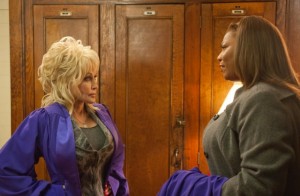
Todd Graff’s Joyful Noise—his latest film showcasing some aspect of the performing arts—isn’t outright bad, but it can hardly be called good. If you saw his first film, Camp (2003), you might think of this as something similar—with gospel (and very ersatz gospel) replacing show tunes and with a notable lack of gay kids. It’s rather as if Graff has been inhabited by the spirit of Tyler Perry. As grim a prospect as that is, there’s something much worse here—the chunks of faux-Southern canny wisdom that issue from Dolly Parton’s character. I haven’t encountered writing like this since my college roommate insisted on watching Hee Haw on TV back in 1972. While I didn’t relish this experience, I admit there was a woman a few rows down from me who was convulsed with mirth every time Ms. Parton said something like, “Trying to fool me is like trying to sneak sunrise past a rooster.” Tastes vary.
The plot begins with choirmaster extraordianaire Bernard Sparrow (Kris Kristofferson) expiring during a performance. (Never fear, the special-billed Kristofferson is brought back—or in light of this film’s bid for religious value, resurrected—for a fantasy duet.) His widow, G.G. (Parton), thinks she will naturally take over the choir, but the church board—seemingly comprised solely of Pastor Dale (Courtney B. Vance, Final Destination 5)—has opted to go with the more traditionally minded choice of Vi Rose Hill (Latifah). Naturally, this results in a battle of wills between G.G.—who wants to tart things up—and Vi Rose, who prefers a more straighforward gospel approach. Their first clash promises something far worse than we finally get, since the initial decision to back their bickering with “cute” music is quickly dropped. That deletion doesn’t improve the script, but it certainly lowers the annoyance factor.
This is all wrapped within about a half-dozen subplots and another two or three stumbling blocks to keep the little Georgia choir from making it to the Joyful Noise competition in Los Angeles and the movie’s preordained conclusion. (The film’s vaguely defined religious leanings may be Southern Baptist, but its plot is pure Calvinist predestination.) The biggest subplot involves a romance between G.G.‘s wayward grandson, Randy (stage actor Jeremy Jordan)—who has been tossed out by his parents, perhaps because he appears to be pushing 30—and Vi Rose’s teenage daughter, Olivia (Keke Palmer). Naturally, Vi Rose distrusts him. Just as naturally, he’s a terrific musician and singer—and so on and on.
OK, the songs are well performed, though I have some questions about reworking and repurposing Paul McCartney’s “Maybe I’m Amazed” as being about God rather than Linda McCartney. (Apart from the dubious theology, I think most Beatle fans would object to her deification.) Similar fates befall Michael Jackson’s “Man in the Mirror” and Sly and the Family Stone’s “I Want to Take You Higher,” but I guess it doesn’t matter all that much. It all sounds fine. And anyway, lessons will be learned—“Jack shall have Jill; Nought shall go ill,” as Mr. Shakespeare said, though he never dealt with gospel competitions. But apart from being easily 15 minutes too long, the movie is harmless enough. Rated PG-13 for some language, including a sexual reference.




“The filmТs vaguely defined religious leanings may be Southern Baptist, but its plot is pure Calvinist predestination”
FYI, the effeminate USA Presbyterians gave up Calvinism and Predestination a long time ago. The Southern Baptists have wholeheartedly endorsed Calvinism and Predestination as a cornerstone of their theology since the early 1980s.
I gladly yield to your knowledge of ecclesiastical shenanigans.